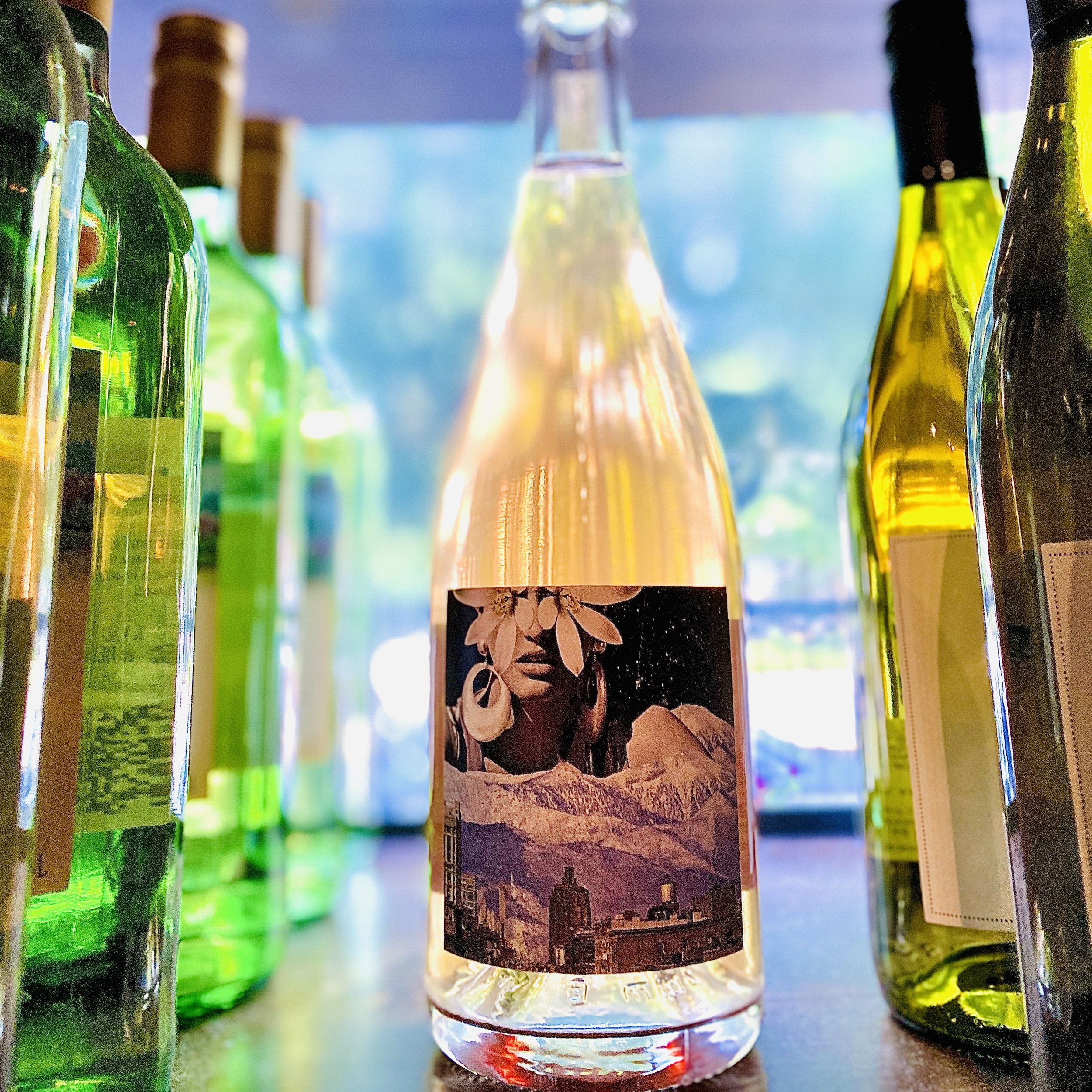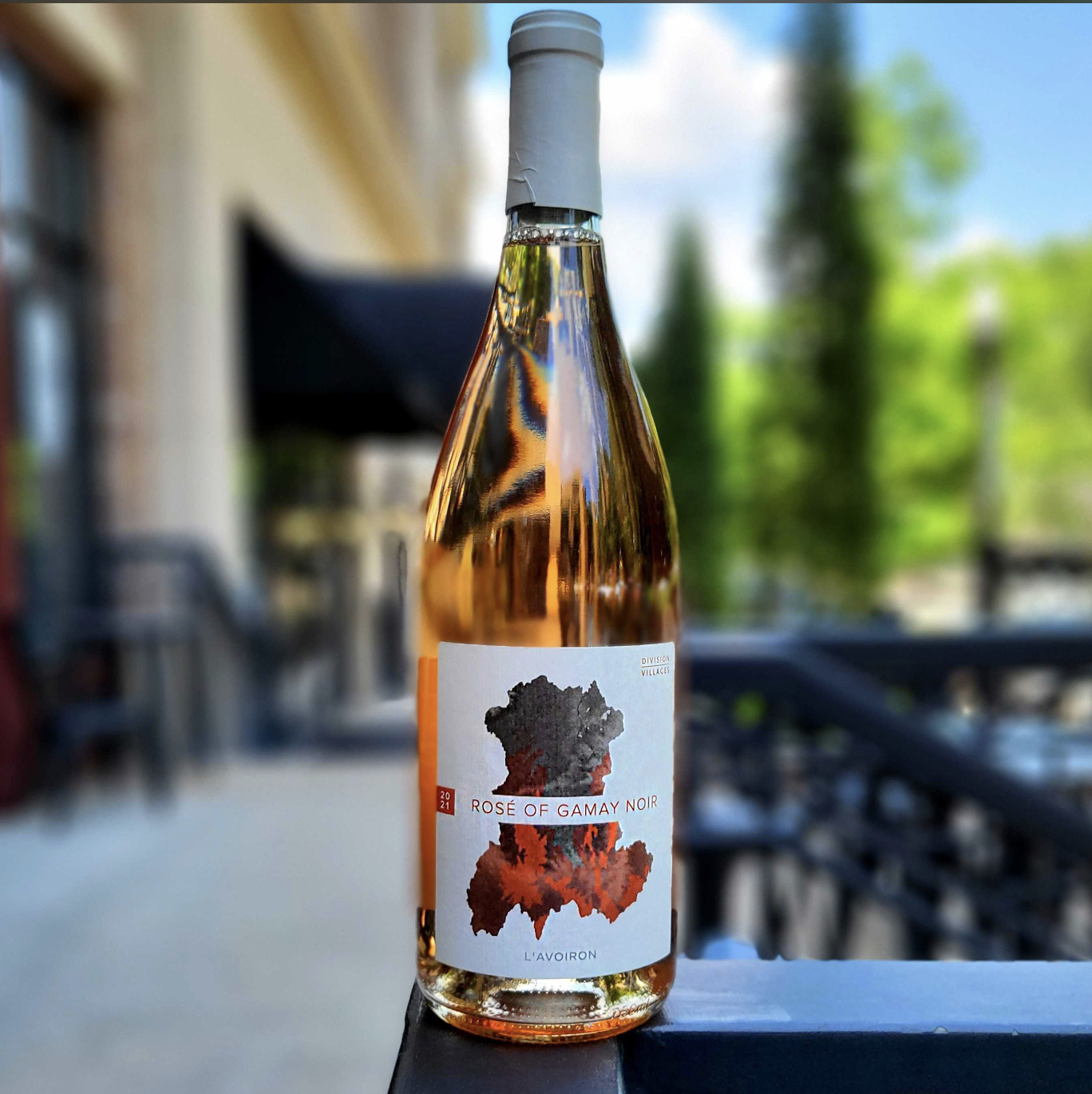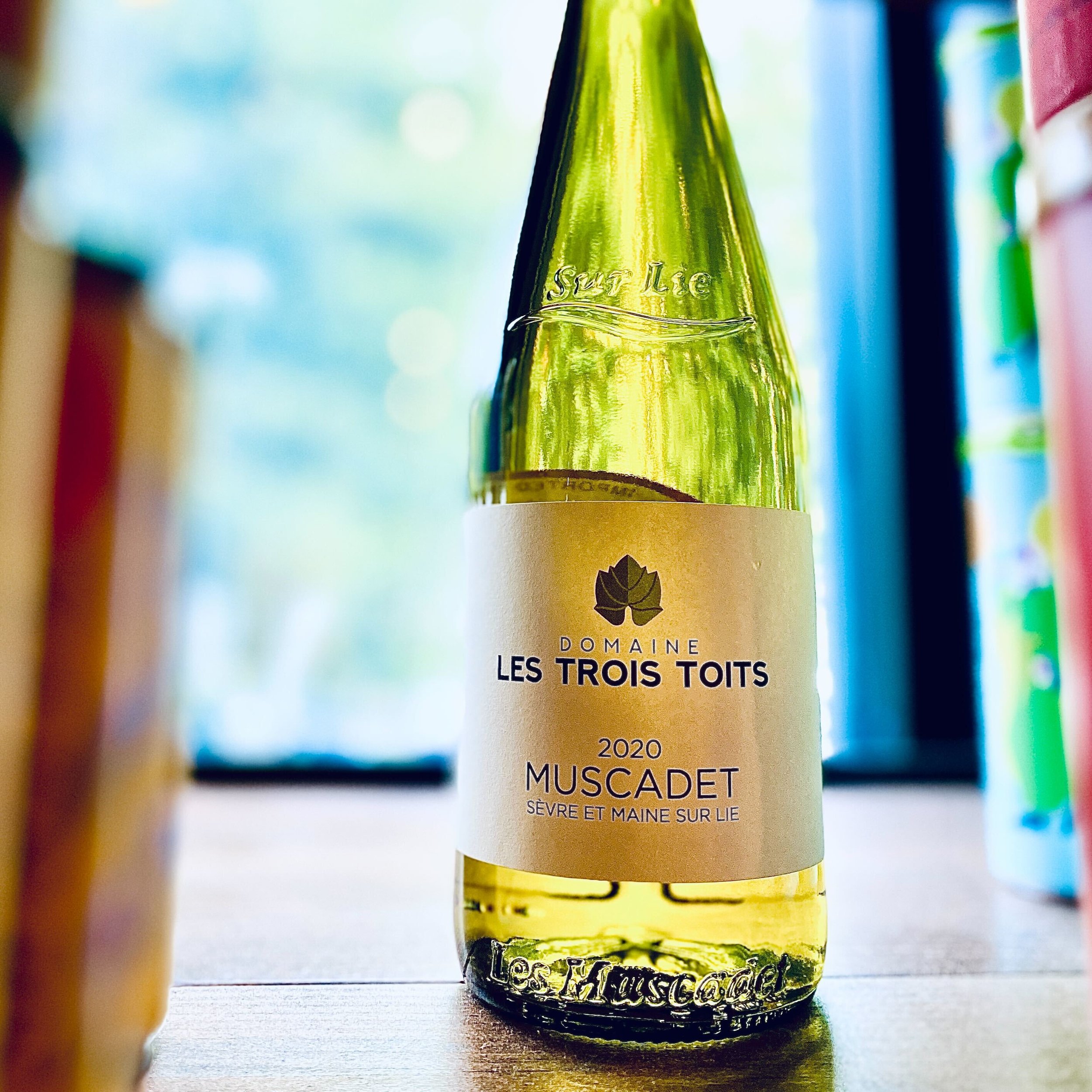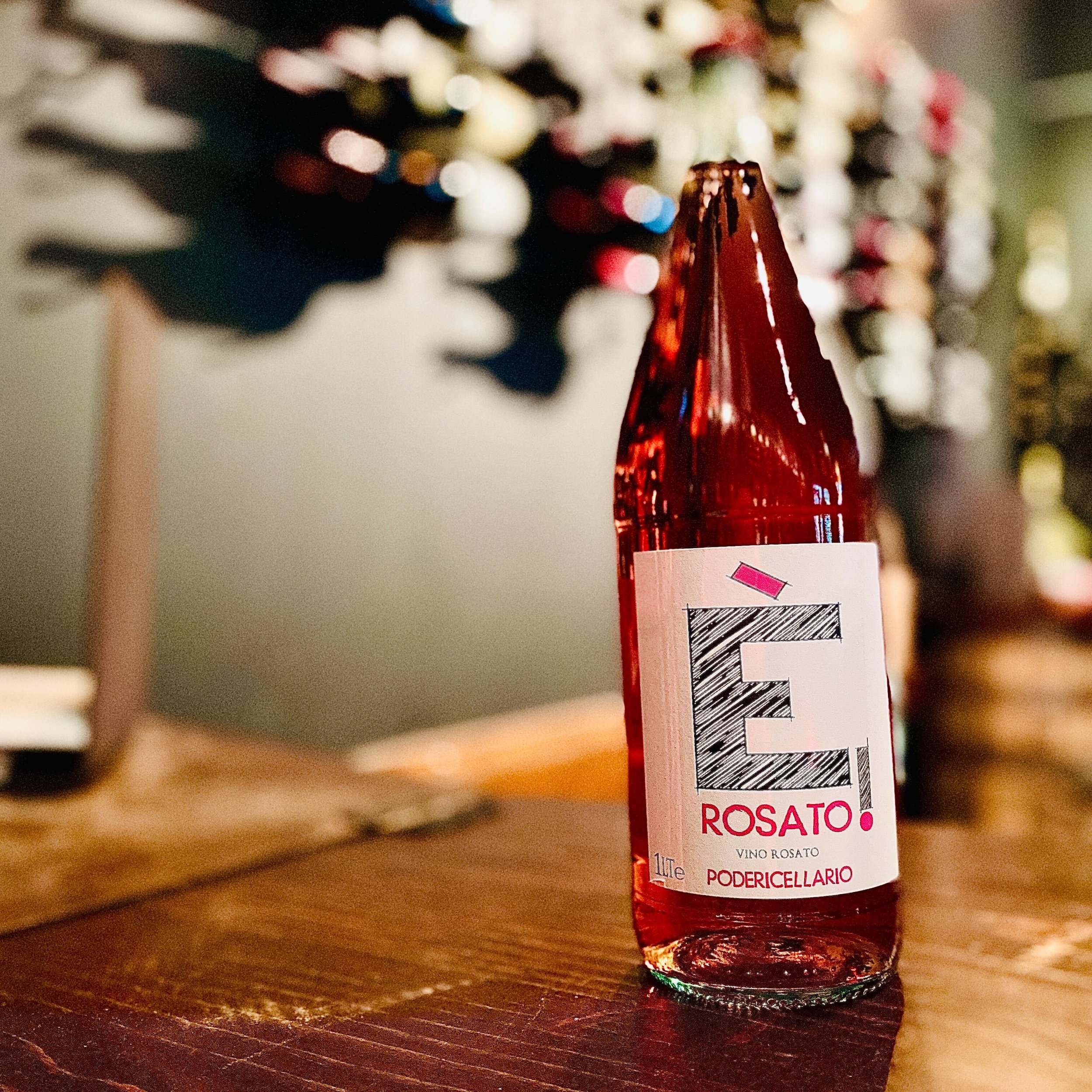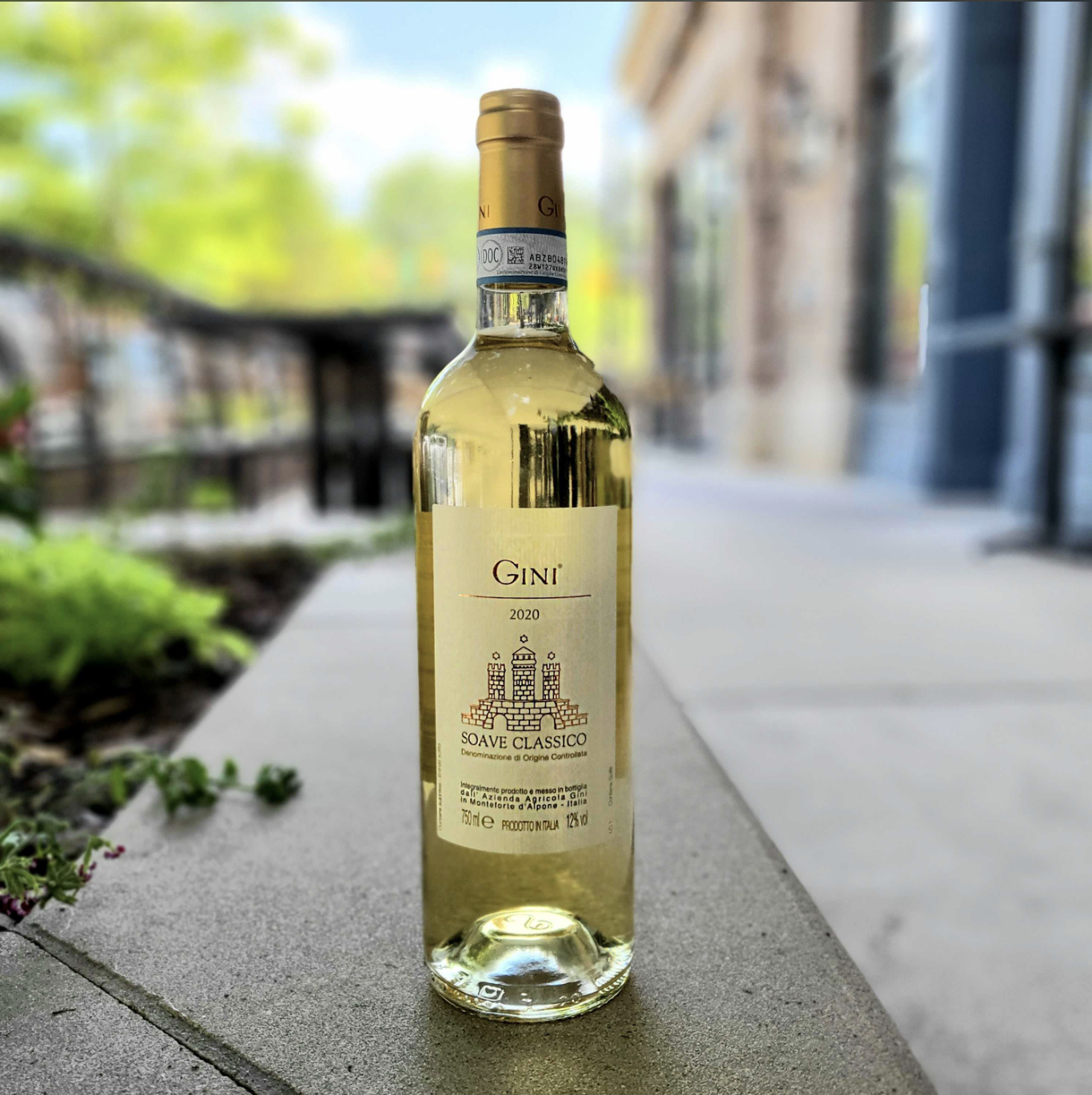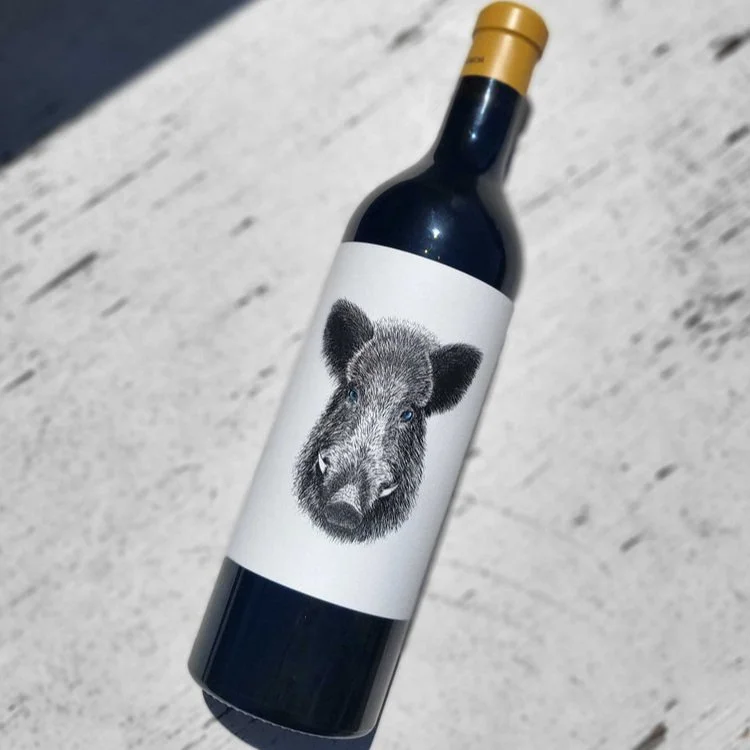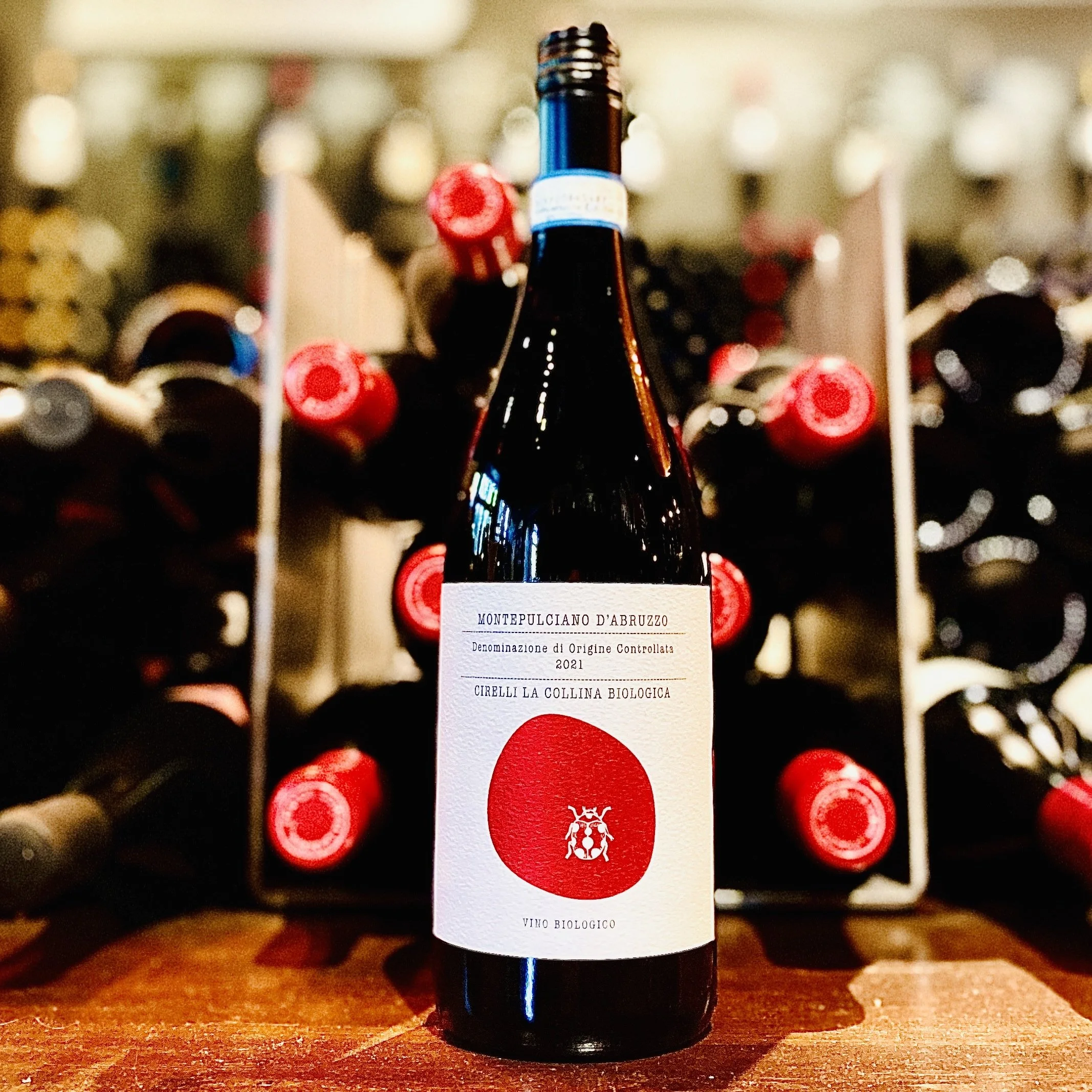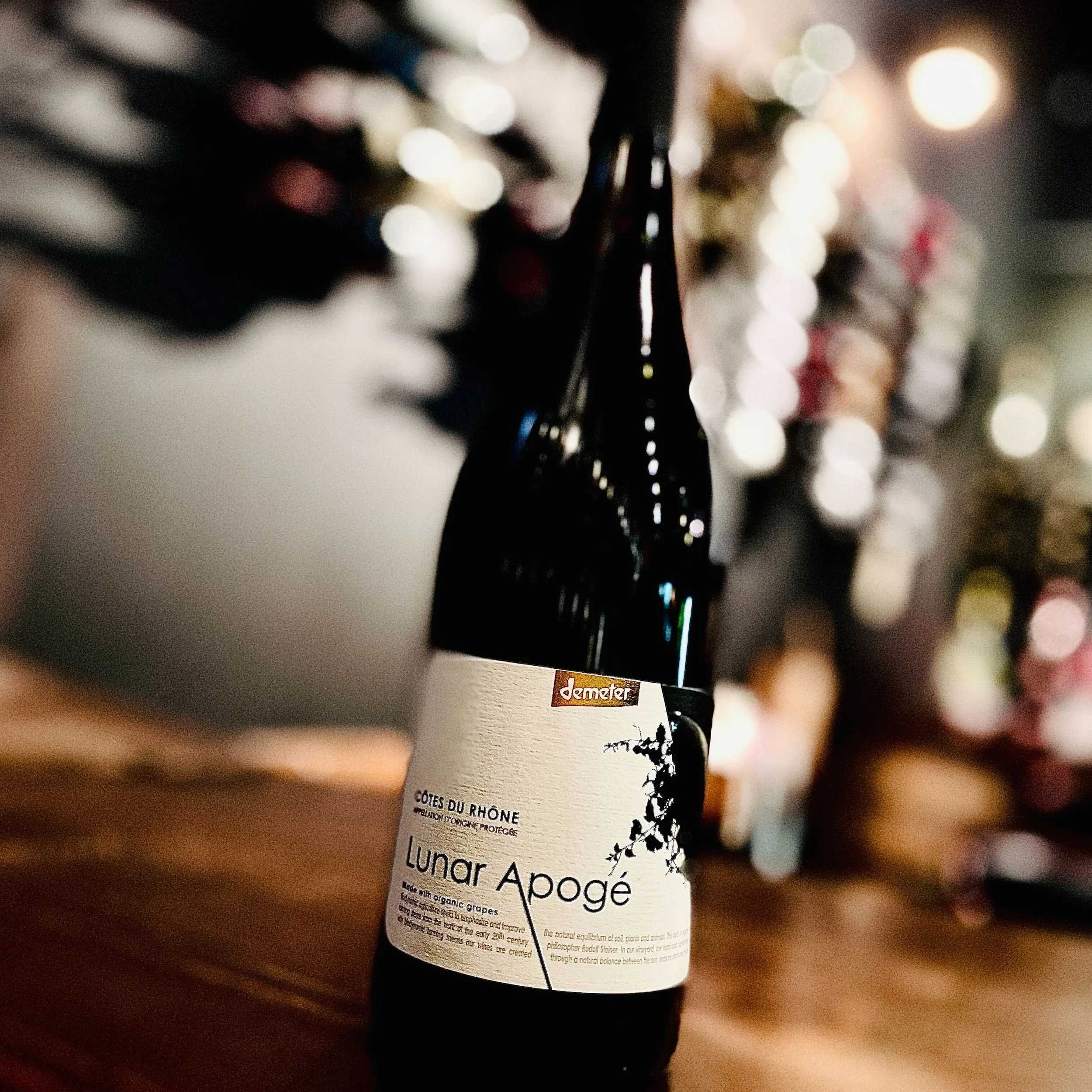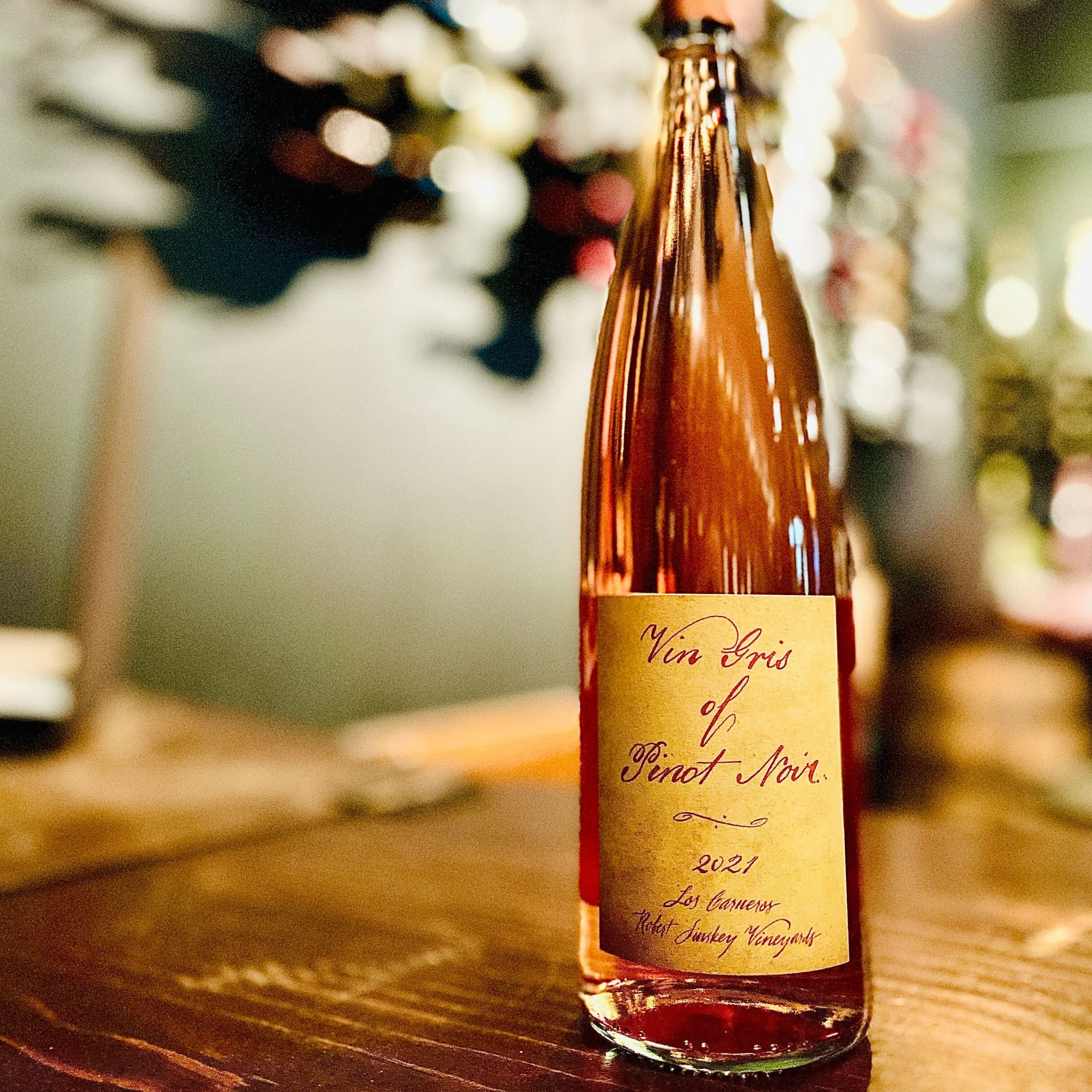UNDERGROUND WINE SOCIETY: June
SCROLL BELOW TO FIND INFORMATION ON YOUR WINES!
The Explorer
$49/month
White/Orange/Rosé
BOTANICA WINES “Flower Girl Pet-Nat”
Grapes: 100% Petit Verdot
Region: Stellenbosch, South Africa
Wine Notes: The grapes were hand harvested at 19 ° B, destemmed, crushed and cold soaked for 30 hours. Gently pressed and left to settle overnight. Racked to stainless tank. Spontaneous fermentation then bottled at 0 degrees balling.
About the Winery: This organically farmed vineyard is situated in a northwest to southeast row orientation trellised in vertical shoot positioning. High density vineyard blocks of 5,600 vines per hectare with an altitude of 200 m. The soil is predominantly decomposed granite, with pockets of shale and sandstone. The vines were planted in 2010.
BRAND Weissburgunder
Grapes: 100% Pinot Blanc
Region: Pfalz, Germany
Food Pairing: Enjoy with a roast chicken and caramelized ramps, a plate of assorted shellfish or a bratwurst, Brussels sprouts and sauerkraut pasta.
About the Winery: Founded in 1891, the Brand winery has been producing wine in the Pfalz for five generations. Their vineyards are located on limestone-rich soils around the village of Bockenheim, in the northern part of the region, along the border of the Rheinhessen. Daniel and Jonas' father, Jürgen, always farmed their vines responsibly, but when his children took over, they immediately transitioned to organic viticulture, gaining certification in 2017. The Brothers Brand also utilize biodynamic treatments, always experimenting to discover which practices work best in their vines. All of their wines are made with little, if any, added sulfites.
DIVISION WINE CO "l'Avoiron"
Grapes: Gamay Noir
Region: Columbia Valley, Washington
Wine Notes: One of the fastest growing and diverse American wine growing regions of the past 40 years is the Columbia Valley, a wide swath of land that reaches from the northern border of Oregon to well into the northeastern parts of Washington State. Within this region is a is the Yakima Valley, which is home to our nearly 6- acre block of Gamay Noir at the newly renamed Carousel Vineyard (formally part of Willard Farms), which we farm exclusively to make our Gamay Rosé and Gamay Nouveau wines. We began to transition this vineyard to organic principle farming in 2019 and hope to have the process complete by the 2021 growing season, We love this particular site for its mineral intense soils formed from volcanic Miocene uplift against basalt bedrock that is layered with a primary topsoil being made up of quartz and lime- silica, overlaid with the mixed glacial runoff of Missoula floods that makes the region so dynamic, unique, and in this case, perfect for making crisp and focused rosé!
About the Winery: Founded in 2010 by Kate Norris and Thomas Monroe, Division Winemaking Company crafts responsible wines with story and purpose. We produce approachable and balanced wines through minimal intervention. Our wines come from responsibly farmed, terroir expressive vineyards in Oregon and Washington, and eschew traditional wine barriers.
DOMAINE DES TROIS TROITS “Muscadet de Sevre et Maine Tiré sur Lie”
Grapes: 100% Melon de Bourgogne
Region: AOC Muscadet Sèvre et Maine, France
Wine Notes: After harvest the grapes are pressed and the juice is placed in underground cuvees in typical and ancient fashion in the Muscadet district. The alcoholic fermentation proceeds at low temperatures for three to five weeks. Afterwards the wine is racked off the gross lies and is left to age on the fine lies until bottling. During the period of elevage, the wines are in constant contact with the lies, with frequent batonage. The result is a fresh, mineral-driven wine that occasionally carries an almost imperceptible effervescence. Bottling normally occurs during the period of March through May of the year following harvest.
About the Winery: The Domaine des Trois Toits was built on the old foundation of an ancient abbey established there in the 17th century. The cave is built entirely of stone and its roof is marked by three peaks – thus its name: “Trois Toits” or three roofs. Hubert Rousseau’s holdings encompass twenty seven hectares and are divided into three plots: the “Clos de la Nicoliere” (15 hectares), the Clos de la Louée (7 hectares) and the “Clos du Bézier” (5 hectares). The vineyards are well situated as they are each in the immediate proximity of the chai; they are also all within the confines of the village of Vertou which is the first commune devoted to the vine as one leaves the city of Nantes in a southerly direction. Vertou is traversed by the river “Sevre” which gives its name to the appellation: Muscadet de Sevre et Maine.
PODERI CELLARIO “È Rosato”
Grapes: Dolcetto (San Luigi Vineyard) & Nebbiolo (Galli Vineyard)
Region: Langhe, Italy
Wine Notes: Hand-harvested into small bins. Pneumatic direct press. Spontaneous fermentation. Aged in Stainless Steel for 6 to 8 months until bottling. Bottled with minimal sulphur (~10ppm) and without sterile filtering or fining.
About the Winery: Fausto and Cinzia Cellario are 3rd generation winemakers in the village of Carru` on the western outskirts of the Langhe. The family believes in only working with local, indigenous Piemontese grape varieties and fiercely defends local winemaking traditions both in the vineyard work and the cellar practices. The Cellario vineyard holdings cover some 30 ha between 5 different vineyard sites covering the southern Langhe. With holdings in Novello and Monforte, the Dogliani plot is arguably the family’s most prestigious land and I would consider them Dolcetto specialists. Vineyard work is organic (soon to be certified) and all the fermentation take place with indigenous yeasts. Sulfur is only added in tiny quantities at bottling if necessary (a practice not common with a winery in this mid-size range).
Gini Soave
Grapes: 100% Garganega
Region: Soave, Italy
Wine Notes: From a minimum of 70-year-old vines planted to volcanic soil, 100% hand-harvested fruit. Fermentation in temperature-controlled stainless steel. Ages on its lees in steel tanks for another six months before bottling.
About the Winery: The Gini family has roots in the Soave Classico region dating from the seventh century, and owns 25 hectares of vineyards situated on the very best hillside position of the appellation. Extremely low yields, low-interference viticulture, and devoted attention to expressing the unique character of each cru results in wines that are not only among the greatest Soaves but also among the great white wines of Italy. Olinto Gini and sons Sandro and Claudio have now finally completed their beautiful new cellar, which extends deep into the rocky and tufaceous hillside of Monteforte d’Alpone, thus providing optimal natural temperature and humidity control. Both tradition and the modern are reflected at Gini. The hand-harvested Soave Classicos are 100% Garganega, though many in the zone blend in other varietals to compensate for shortcomings of less-than perfect grapes. Both the Soave Classico and the single-vineyard “La Frosca” are vinified in stainless steel. The rich, concentrated “Salvarenza”, from a tiny plot of 80-year-old vines within the La Frosca vineyard, is matured in barriques. The Re Nobilis is a rare representative of a botrytized style Recioto, northern Italy’s version of a German TBA, while the Recioto Col Foscarin is a delightful desert wine, also great with cheese.
OVUM “Big Salt Orange Rosé”
Grapes: 50% Pinot Gris, 25% Riesling, 15% Gewürztraminer, 7% Early Muscat, 1.5% Sauv Blanc, 1% Pinot blanc, & .5% others...
Region: Willamette Valley, Oregon
Wine Notes: “What is an orange rosé you ask? We don’t know either. Big Salt “Orange Rosé” is nearly an equal blend of ramato style Pinot gris, and Big Salt FERMENTED & AGED IN NEUTRAL BARREL. The combination of these production methods left us with a wine that doesn’t look or smell like a rosé – it isn’t as funky or extracted as an orange wine – it lives somewhere in between…or beyond? 2021 BSOR has a cranberry meets Sunny D color, perhaps due to the 14 day PG skin fermentation. The Big Salt components that went into barrel saw anywhere from 8 hours of skin contact up to 3 days.
Big Salt “Orange Rosé” on the surface is a fun wine, but hiding in the depths is a brooding root veg earthiness. So, feel free to soak in the sunny, warm shallow waters, it’s nice there – but if curiosity pulls you to the deep end you may be rewarded with the earthly delights of Oregon terroir. “
About the Winery: Established in 2011 by Ksenija and John House, Ovum was founded in hopes of producing Oregon white wines that are honest reflections of time and place. Our low intervention production method is a commitment to letting the vintage and vineyard shine, not the vintner. Fruit comes first - our top priority is finding farmers that share our beliefs, and then getting out of the way so their hard work can be tasted.
Native ferments, no subtractions or additions, except for SO2 - extended lees contact 8-9 months, for textural complexity. All of this is done in neutral barrels of acacia and oak, as well as cement egg and Austrian cask. Ovum is solely committed to the production of white wines, mainly Riesling, Gewurztraminer, and Muscat.
At Ovum, each wine is produced the same way - if the wine smells and tastes different, it has everything to do with terroir, and little to do with the winemaker. Our hope is that through our attention to detail and honest technique, we can produce old fashioned wines in the modern world.
Reds
CASA ROJO “Enegmio Mio”
Grapes: 100% Garnacha
Region: Murcia, Spain
Wine Notes: Aged during the alcoholic (22 degrees) and malolactic fermentation in the French wood fudres of 11,000 kilos, and later for 4 more months until stabilization prior to bottling. From a single 4-hectare vineyard at the foot of the Sierra de La Pila, just in front of the winery The age of the vineyard is 5 years old and it is 100% property with north orientation and fresh clay soil. Due to the natural vigor of our Garnacha clone, we perform thinning and green pruning in May and June to reduce bunch load on vines.
About the Winery: “Craft great wines takes time and a lot of dedication. Constant improvement, continuous evolution and the search for perfection in the vineyard and after in the winery, is the only way. I believe, that only when you are in love with your job, you can dedicate everything to it.We make wines that represent us. Wines with which we feel identified. We are lucky to craft in the two areas that we love and admire, with the two grapes that we are passionate about, Tinta Fina in the continental climate of La Ribera del Duero and the Monastrell in our Mediterranean home, Tierra de Murcia.”
- Laura Munoz-Rojo
CIRELLI
Grapes: 100% Montepulciano d’Abruzzo
Region: Abruzzo, Italy
Wine Notes: The Montepulciano grapes, coming from our own vineyards and some other rented, are collected in boxes and carried to the cellar.
Here the grapes are de-stemmed and gently crushed, then transferred into the clay amphoras where our indigenous yeasts take over and lead the fermentation process.The grape skins are softly plunged into the juice, in order to prevent the extraction of the stronger tannins. The maceration process usually last around twelve days, after which the skins are separated from the wine and softly pressed. The Montepulciano wine then rests and refines in the amphoras all the way through the malolactic fermentation, until it is ready to be bottled.
About the Winery: The sea is only 8 kilometers away and rolling hills, vineyards and olive groves surround the variegated landscape of the town of Atri in the Abruzzo region where our farmland lies. Nearby, national parks, woods and badlands, all wonderfully preserved, are waiting to be discovered in the majestic silence that seems to characterize this region of Italy suspended in time and space. Cirelli Farms is the name of our IMC*-certified organic farmland situated on 22 hectares of fertile land. Everything produced on our farm is done so respecting the sustainable natural cycles of our olive groves, vineyards, organic horticultural crop fields and animal breeding. Crop rotation, a period of rest for the soil, fertilization and livestock grazing are only some of the vital steps in the process of producing wine (in terracotta wine jars). Cirelli Farms grow and produce in full compliance with organic farming laws, however we believe that nature itself dictates its own laws and it is these laws upon which we base our farming procedures:
“When I make wine, I imagine I am an alchemist preparing a magic potion. An antidote to misery, a balm for healing old wounds, a drink that makes us forgive but not forget.” An existential declaration, a message of unconditional love.” - Francesco Cirelli
DOMAINE GRANGER
Grapes: Gamay
Region: Beajolais, France
Wine Notes: A special cuvée sourced from old vines planted in the « Le Bouteau » vineyard in Leynes, the northernmost village in the Beaujolais district. This wine, due to its substantial structure, undergoes a longer cuvaison and an extended elevage. With its breadth of flavors (red fruits and wild berries) and wealth of backbone, this wine will provide positive surprises as it offers proof of the superior qualities of the best of this modest appellation. The majority of this cuvée is shipped for our use in the US market … 3600 bottles annually.
About the Winery: The Domaine Pascal Granger is located in the hamlet of Les Poupets within the village of Juliénas in the heart of the finest sector of the Beaujolais district. This estate has been in the Granger family for over two hundred years, dating to Napoleonic times, and has passed from father to son continually. The domaine encompasses 14 hectares with vineyard holdings in the home village of Juliénas and extending through the neighboring villages of Jullié, Chénas, La Chapelle de Guinchay and Leynes. All harvesting is done manually and treatments in the vineyards are minimal with weed-growth tolerated between the vines.
FABLE MOUNTAIN VINEYARDS “Raptor Post”
Grapes: Syrah / Shiraz, Mourvèdre, Grenache Noir
Region: Western Cape, South Africa
About the Winery: Fable Mountain Vineyards is an isolated property tucked high up in the Tulbagh region against the Witzenberg Mountain range, approximately two hours from Cape Town. You must dodge baboons through the mountain pass and drive a few miles up a deserted dirt road to get there. Once you step foot on the farm, with mountain views surrounding, you realize this is a very special place. The west-facing vineyards are farmed organically and lie between 400-650m in elevation, straddling the edge a wilderness reserve. Syrah, Grenache, and Mourvédre, dominate the farm’s plantings, as they thrive in this hot, dry climate. The mountains offer more than just a breathtaking view, they offer shade over the vineyards for part of the day, thus slowing the ripening, a key for maintaining natural acidity. During the winter, this is one of the coldest parts of the Cape wine lands allowing the vines to reset and conserve energy for the strenuous growing season. In addition to the 32 hectares of vineyards, Fable Mountain strives to maintain a balanced, diverse farm ecosystem. During the winter months, herds of Nguni cattle and Merino sheep graze through the vineyards. This, combined with ample cover cropping, provides natural compost and aids in building soil. For the past several years, Tremayne Smith has taken the reins as head winemaker at Fable Mountain. He is incredibility deliberate and thoughtful in his approach to wine, always striving for freshness, texture, and balance. The winemaking process at Fable Mountain is a hands-on affair, all grapes are sorted by hand and fermented naturally in small tanks and barrels. They employ a gravity-fed system in the cellar to ensure gentle extraction and subtle tannin development. Tremayne is at the top of his game right now and each vintage we look forward to that first taste.
KOEHLER-RUPRECHT
Grapes: 100% Pinot Noir
Region: Pfalz, Germany
Wine Notes: The grapes were handpicked, destemmed and fermented in stainless steel; pressed after 4-6 weeks and aged for two years in one new Doppelstück (2400L) and some old Halbstück (600L) barrels.
About the Winery: “Our winery, which is one of the most famous and distinctive wineries in the Palatinate, is located in the center of the village of Kallstadt, which is on the German Wine Route. With a focus on quality and tradition, the grapes from our 12.5 hectares of vineyards, which are mainly characterized by limestone, are selectively harvested by hand and gently processed. All wines are fermented spontaneously and consistently matured in old wooden barrels. The long yeast contact and late bottling result in wines with a good balance of power, elegance and longevity.”
CHATEAU DU PETIT THOUARS “Les Georges”
Grapes: 100% Cabernet Franc
Region: Chinon, France
Wine Notes: Les Georges wines are all about the freshness and flavour of the aromas. These summer wines elaborated from the "vin de goutte" (free run juice) are matured up to 6 months in stainless steel tanks. These wines are good to drink now but can be kept 3 to 5 years.
About the Winery: When Yves and Marguerite du Petit Thouars married in 1974, they couldn’t imagine 35 years later they would be managing a 16-hectare vineyard with a fully equipped winery nestled in corridors of natural limestone caves. Everything started when they found charts in the archives of the family castle (bought in 1636 on the advice on the Cardinal de Richelieu and which has passed in a direct line from father to son to the present generation) showing there had been a vineyard for centuries. True to the spirit of the times and the adventurous nature of their ancestors, they planted new vines, developing the estate and making each new vintage better than the previous one. Marguerite du Petit Thouars even became a highly respected wine writer, collaborating with Cuisine et Vins de France, Le Figaro Magazine, and l’Amateur de Bordeaux.
LUNAR APOGÉ CÔTES DU RHONE
Grapes: 50% Grenache, 30% Syrah, 10% Mourvedre, 10% Cinsault; 35+ year old vines, estate grown
Region: Roquemaure, France
Wine Notes: Biodynamic. Dry farmed. No chemicals used (pesticides, fertilizers, additives, etc). Hand harvested at night to prevent oxidation. Spontaneous, temperature controlled fermentation with native yeasts. Minimally fined or filtered. Sulfites ≤50.
About the Winery: Lunar Apogé is made in Roquemaure, France, where the Leperchois family has been making wine for centuries. In 1977, Christian Leperchois became a pioneer in his region by converting the estate to a fully organic/biodynamic process. His wine and the winery are certified 100% organic and biodynamic by Demeter. Christian, an avid advocate of biodynamic farming, explains why he calls it ‘natural’ viticulture: “…great wines can only be produced by working with nature, not struggling against it… after 25 years of observations and occasionally bitter experience, there is no longer a place for the ethics of productivity in the natural equilibrium at Lunar Apogé.” Christian is mindful of all of the vineyard’s natural surroundings, and takes inspiration from their rhythms. The vines are dry farmed and no chemicals are used (pesticides, fertilizer, additives, etc). Instead, composted grape pomace is used as fertilizer in the fall, plowed in by hand around the base of the vines. The vines are painstakingly cared for by hand throughout the year: vigorous pruning in the fall, disbudding in the spring and thinning of excess clusters in the. Finally, the grapes are harvested by hand. In the winery, traditional methods are used to foster the most natural and complete embodiment of the fruits of the vine. Spontaneous fermentation takes place with native yeasts and the wines are minimally fined or filtered. Sulfites are ≤50 mg/L. The results are elegant, award winning wines – beautiful expressions of soil, place and the passion of the men and women who toil there.
SUPA DUPA
Grapes: Cabernet Sauvignon
Region: Alexander Valley, California
Wine Notes: Sourced entirely from certified sustainable vineyards, Supa Dupa Cabernet Sauvignon, is a classic expression of California Cab. It is elegant, but it also has enough power to handle a juicy steak and a hearty vegetarian or vegan dish, and is a perfect match with cheese or simply by itself as a glass before dinner. Hand-selected and produced in limited quantities, it is a Supa Dupa wine at a Supa Dupa price!
After the grapes were harvested, they were brought to the winery, gently de-stemmed and transferred to stainless steel tanks for fermentation. Punch downs (submerging the wine’s “cap” of solids) took place daily - the wine gaining color and flavor. Once fermentation was complete, the wine was racked (transferred gently) into French oak barrels (45% new) to age for 12 months prior to bottling.
About the Winery: “Our Alexander Valley vineyards are located between the cities of Healdsburg and Cloverdale, along the banks of the Russian River, and benefit from the sandy alluvial soils and large rock fields laid down by the river’s passage over the past many hundreds of years. The warm growing season in the Alexander Valley makes it an ideal spot for ripening varieties like Cabernet Sauvignon. The region has been the source of some of California’s best and most well-known cabernets and now we can add Supa Dupa to that list.”
PASSIONATE WINES “Via Revolucionaria”
Grapes: 100% Criolla Grande (Pais)
Region: Tupungato; Uco Valley; Mendoza, Argentina
Wine Notes: Grown at 3,450 feet in alluvial, rocky soils. Macerated with the stems, then fermented with native yeasts; aged 5 months in concrete egg. 200 cases produced. Organic.
About the Winery: Passionate Wines is the brainchild of Matias Michelini. He is the winemaker, agronomist, and Grand Poobah of his winery named Passionate Wines. Matias strives to make experimental wines that express terroir. These wines are low production and are drawn from multiple inspirations, regions, and styles. The Via Revolucionaria wines are single vineyard, unconventional wines, fermented with native yeast. Matias continues to experiment with other cuvees with the mantra of producing either atypical varietals or classic varietals in non-traditional methods.
D. VENTURA “Viña do Burato”
Grapes: 90% Mencía and 10% Merenzao
Region: Ribeira Sacra; Galicia, Spain
Wine Notes: After a manual harvest in small boxes, the grapes are treated as simply and respectfully as possible. The grapes are completely destemmed and spontaneously fermented with indigenous yeasts in temperature-controlled stainless steel tanks. Bottled from the tank without fining or filtration and a very low addition of sulfur at bottling.
In 2019 Ramon Losada made only one wine: Viñas do Burato. It is a blend of 70% Burato vineyard on the Miño river and 30% Caneiro vineyard, on the Sil river. Caneiro is planted to the indigenous red mencía grape, located in the Amandi sub-zone of Ribeira Sacra, which is revered as one of the best sites in the region. Viña Caneiro is a steep, 90-year-old, 1ha vineyard planted on schist soils known locally as losa, with stone walls and vines that plunge towards the Sil river in one of the most picturesque and famous spots in Ribeira Sacra. The river adds a sweet freshness to this plot, cooling it during the heat of the day, producing opulent Grand Cru-level wines reminiscent of Côte-Rôtie in France. The Burato vineyard is in a totally different area on the Miño river, north of the other two plots. Here the landscape is lush with a significantly cooler climate and higher average rainfall. Streams flow directly through the vineyard on their way to the Miño. The soils are mixed granitic and alluvial. The vineyard is planted to mencía and merenzao (trousseau) which yields crisp, refreshing red wines with mouthwatering acidity. Ramon does not use any chemicals in the vineyard, nor corrections in his winery and makes the wines simply, without intervention or fancy winemaking. D. Ventura is transparent farmer wine from Ribeira Sacra.
About the Winery: D. Ventura is the soft-spoken Ramón Losada and his family, who farm 6ha of old vines to make small amounts of single-vineyard wine in one of the most remote wine regions in the world, Ribeira Sacra. Ramón is the picture of a humble farmer, with his full-time job as the village veterinarian consuming whatever time is left after tending to his vines. He even finds a little time to raise a rare heritage breed of Galician pig, from which he makes incredible sausages to keep the breed going. In 1999, he and his sister Belen refurbished the cellar in the ancient family farmhouse in Pantón and began bottling and selling their wines, which until then were for self-consumption.
The Connoisseur
$98/month
ANNE PICHON
Grapes: 100% Viognier
Region: Rhone, France
Wine Notes: Certified organic Soil: both sandy and chalky-clay soils Altitude / Exposure: 350m / SE Ave. Year Vines Planted: 2003 Trellis System: Guyot Harvest Technique: by hand Fermentation: 100% in stainless steel tanks after light press and short maceration for color Aging: 2-3 months on lees.
About the Winery: Anne Pichon and her late husband, Marc Pichon, started an agrarian-bohemian life together in the 1990’s when they moved into an abandoned farm house at the base of Mont Ventoux. The began to resurrect the a defunct domaine called Murmurium, meaning “the buzzing song of bees.” And while the 15 hectare vineyard was in poor shape, the site was properly organic for many years leading up to Anne and Marc’s stewardship. Today, Anne produces no more than 40 barrels of wine for T. Edward along with her sister-in-law Véronique who manages the commercial affairs. The wines themselves are named “Sauvage” inspired by the Pichons’ respect for and attachment to nature.
The micro-climate Anne Pichon’s vineyard is dry, with cool, manually tilled soils that retain moisture when it rains. And because of the Mistral that sweeps up from the hills below, fruit is less susceptible to rot and disease, providing and ideal environment for organic viticulture. Employing careful vineyard management, low yields and late harvesting, Pichon hand-harvests and de-stems all of the fruit. Reds are vinified in small 50 HL cement tanks or stainless steel, at low temperature to achieve a long maceration and two gentle pump overs daily, with additional manual punch downs if necessary. The fermentations extend 3 to 4 weeks with a slow progressive increase in temperature to extract a very fine tannin structure. The malolactic fermentation and ageing take place partly in oak barrels but mostly in cements tanks. White wines are made from only a light pressing of first run juice and vinified in stainless steel tanks with strict temperature control to maintain a balance of ripe fruit and freshness.
DONKEY & GOAT Lily’s Pet Nat
Grapes: Chardonnay
Region: Anderson Valley, California
Food Pairing: Pair with eggs, caviar, brunch, fried chicken, or a sunlit garden!
Wine Notes: Pet Nat, short for pétillant naturel, can be made from any grape variety (this one is Chardonnay) and is a simpler and ancient way to make sparkling wine. In its purest form, as ours is, the ingredients are limited to grapes (with no Sulphur added). After spontaneous fermentation begins, but before it is complete, the wine is bottled and fermentation continues, creating those delicious bubbles. Jared made our first Lily's in 2011 and ten years later it remains our go-to wine for brunch, lunch, picnics and beach days. This wine will please many palates and is made for al fresco dining, preferably with your shoes off.
About the Winery: Donkey & Goat was founded in 2004 after we spent a year with the inimitable Eric Texier where we studied the art of crafting natural wines in the Rhone Valley. We are celebrated for being amongst a handful of pioneers in the Natural Wine community (our daughters call us Old) because in 2004 we were unique for our ecological principles driving decisions in both the vineyard and the cellar and ten years later for being one of the first to list ingredients on our label. Today we continue to push boundaries and most recently with our initiating a dialog around the future of crafting delicious natural wines in the face of impact from climate change.
ROBERY SINSKEY “Vin Gris”
Grapes: 100% Pinot Noir
Region: Napa Valley, California
Food Pairing: An eager partner for veggies, seafood, paninis, charcuterie, just about anything off the grill and even slightly spicy foods like tacos and curry
Wine Notes: 2021 was the first time in 35+ years that the ponds collected zero water; no subsurface water and no rain was collected during the vintage. RSV dramatically reduced production to conserve water and help keep the vineyards healthy. The Vin Gris was the only wine produced in 2021 and, because of the drought, the vines produced 30% less fruit than expected. The upside - smaller and lower weight clusters created fruit with amazing intensity and flavor for a beautifully expressive Vin Gris. Exuberant aromas and flavors are intertwined with a mouth watering crispness and just the right back bone of minerality to balance the lush fruit… an exceptional wine.
About the Winery: RSV believes luxuriously elegant wine and earth friendly farming are not mutually exclusive. Caring for the land, combined with conscientious business practices (solar power, alternative fuel, biodiversity, using animals to mow the cover crops, to name a few) define the elegant and well-crafted style that is RSV. Good wine shouldn’t hurt… your palate or the planet.
IDLEWILD
Grapes: 100% Nebbiolo
Region: Mendocino County, California
Wine Notes: "“After five years of drought, it felt nearly surreal to see rivers floodingover their banks and lakes filling to their brims. We experienced a wet Winter, a normal bud-break, and quite a normal (albeit wet) Spring. Everything kept rolling along smoothly allthrough summer, and despite the intense heat, the canopies were lush and provided plentyof shade and cooling. Right as things seemed perfectly on track, a late summer heat spikeset in across the North Coast, and the game suddenly changed. A month of harvest wascompressed into a week. This intense home stretch had me worried, but the vineyard heldon beautifully. For those who picked fast and furiously and are working with varieties thatcan handle some heat, it is a gorgeous vintage.I always look towards traditional methods from Piemonte while focusing on the fact that Iam in Northern California. The Nebbiolo very much comes from this place of balancing tradi-tion reimagined in new soil. The grapes were left 100% whole cluster and foot trodden. Thewine was fermented via native yeast in Slovenien oak vats and then topped and sealed up foran extended maceration of nearly ninety total days on skins (and stems). This is old fash-ioned, but it yielded amazing depth and spectrum in a decidedly ethereal feeling wine. A year in Slovenien oak vats, then a year in large format Slovenien oak Botti, and finally a yearin bottle is the timeline of it’s elevage.”
About the Winery: “I grew up hanging out in a winery converted from an old cow barn, walking vineyards, and tasting blends with my dad. Later, while in the restaurant industry, I was exposed to wines from across the globe and was especially struck by the wines of Italy’s Piedmont. Learning natural systems and the world of wine in general was my route to making wine and starting Idlewild. I was also fortunate to have many friends and family to learn from along the way.”
- Sam Bilbro, Winemaker
ODERRO
Grapes: 100% Nebbiolo
Region: Barolo; Piedmont, Italy
Wine Notes: Rigorous manual selection of grapes in the vineyard. Fermentation and maceration in stainless steel for 20 days at a controlled temperature of 28-29°C, followed by malolactic fermentation. They occur separately for the three vineyards, as well as the malolactic fermentation. The wines coming from the different vineyards are aged separately in 40, 60 and 75 – hectoliter Slavonian and Austrian oak barrels for 30 months. The wines are blended in the spring, then bottled at the end of the summer and aged in the bottle for another 6 months before release on the market.
About the Winery: It is difficult to pinpoint a precise date for when our ancestors began making wine, though the vineyards and farmhouses that we live in today have always belonged to the family. From researching parish and township documents, however, we can confirm that the Oddero family has been present in the territory of La Morra since at least the 18th century. Through writings, notarial acts, and personal photographs, we know that Giovanni Battista Oddero (1794 -1874)—and after him, his sons Lorenzo (1821-1903) and Luigi (1832-1893)—began to vinify grapes in the township of La Morra between the 18th and 19th centuries. It is through their efforts that our wines were introduced to the rest of the world. First, they were sold in small barrels and demijohns, and by 1878 they were sold in bottles through the efforts of the first Giacomo Oddero (1851-1915). Several recent findings demonstrate that near the end of the 19th century, Barolo Oddero was already being successfully exported to the Americas in small oak barrels. Other wines earned important recognitions in Italy. In 1911, our Barolo was part of the International Exposition of Turin. It was included in a wine tasting organized by the Subalpine Oenophiles Guild (Circolo Enofilo Subalpino) in occasion of the 50th anniversary of the Unification of Italy.
The history of today’s winery is inextricably tied to that of Giacomo Oddero, born in 1926 and grandson of the first Giacomo in the family (whom he was named after). Giacomo was an eclectic character with vast cultural interests. In the 1950s, he renovated the ancient farm and house and began the arduous task of elevating the quality and prestige of the area’s wines—not only his wines, but of the entire Province of Cuneo. Among his many public and administrative tasks, he was the provincial Assessor of Agriculture and signed many of the procedural guidelines called disciplinare that gave wines of the Langhe and Roero their DOC and later DOCG certifications. He was also the guiding hand behind many regulations for nearly all of Piedmont’s principal agricultural crops, from cheeses to the Langa hazelnut and vegetables grown on the plains. In 1997, Giacomo Oddero formed the National Center for Alba Truffle Studies (Centro Nazionale Studi sul Tartufo d’Alba), today the principle center for Italian research in the study and promotion of the “King of mushrooms,” the Tuber Magnatum Pico. Under Giacomo’s guidance, Poderi e Cantine Oddero took on its current productive configuration, extending vineyard property, increasing bottle production, and upholding a high quality that today is recognized worldwide.
“Ernest drank Valpolicella because he was around Venice, and in those days the Oddero brothers of La Morra couldn’t get their wines to him. But if he’d known Oddero Barolo he would not have turned to the liquor which ultimately killed him.”
-Gianni Brera, Journalist
Joan d’Anguera Finca l’Argatà
Grapes: Garnatxa
Region: Catalonia, Spain
Wine Notes: If you haven’t tasted Finca l’Argata for a few years you might find yourself surprised how this cuvée has evolved to reflect the new minimalist style at Joan d’Anguera. Once a blend of Garnatxa, Syrah and Cabernet Sauvignon and aged in new wood, Finca l’Argata is now pure Garnatxa sourced from sandy clay and limestone soils from head-pruned vines ranging in age from 40-60 years old. It is fermented whole cluster in concrete and aged wellseasoned French oak barrels.
About the Winery: The story is so familiar it really could write itself. A bucolic setting, a familial cast of characters, decades of struggle and innovation that looks as much forward as it does backward. In Spain this is the story of many properties now under the leadership of a younger generation, youthful wine growers who have returned to their roots after taking inspiration from further afield. Ask Josep and Joan d’Anguera who they see as benchmark estates, they are as likely to site Roagna or Gramenon as any compatriot. Turning this insight inward, they’ve asked themselves not, how can we copy these wines? But instead, how can I make my land and my vines speak as expressly? The first step towards the reinvention of Celler Joan d’Anguera was the transition to biodynamic farming with certification by Demeter in 2008. Returning to the land in such an intimate manner taught them to appreciate their oldest vines – their indigenous inheritance. As each site responded to the practices of biodynamics, they discovered that what was once though of as rustic was merely abused, misunderstood or disregarded. Having reduced yields by close to 50%, they began to discover that each site had its own character – something that is now captured in each cuvée that they make. Having sorted their vineyards, Josep and Joan turned to their cellar practices. With healthier fruit, lower yields and better balance in ripening they were able to transition to whole cluster fermentation by indigenous yeasts. Concrete is now the preferred fermentation vessel and the fruit is crushed by foot. Macerations are long but very gentle with the goal to coax out the character of each parcel rather than extract it forcefully. Aging in now done in neutral, well-seasoned French oak barrels, demi-muids and foudres so as to not impart any flavor of wood in their wines.
SUPA DUPA
Grapes: Cabernet Sauvignon
Region: Alexander Valley, California
Wine Notes: Sourced entirely from certified sustainable vineyards, Supa Dupa Cabernet Sauvignon, is a classic expression of California Cab. It is elegant, but it also has enough power to handle a juicy steak and a hearty vegetarian or vegan dish, and is a perfect match with cheese or simply by itself as a glass before dinner. Hand-selected and produced in limited quantities, it is a Supa Dupa wine at a Supa Dupa price!
After the grapes were harvested, they were brought to the winery, gently de-stemmed and transferred to stainless steel tanks for fermentation. Punch downs (submerging the wine’s “cap” of solids) took place daily - the wine gaining color and flavor. Once fermentation was complete, the wine was racked (transferred gently) into French oak barrels (45% new) to age for 12 months prior to bottling.
About the Winery: “Our Alexander Valley vineyards are located between the cities of Healdsburg and Cloverdale, along the banks of the Russian River, and benefit from the sandy alluvial soils and large rock fields laid down by the river’s passage over the past many hundreds of years. The warm growing season in the Alexander Valley makes it an ideal spot for ripening varieties like Cabernet Sauvignon. The region has been the source of some of California’s best and most well-known cabernets and now we can add Supa Dupa to that list.”
KOEHLER-RUPRECHT
Grapes: 100% Pinot Noir
Region: Pfalz, Germany
Wine Notes: The grapes were handpicked, destemmed and fermented in stainless steel; pressed after 4-6 weeks and aged for two years in one new Doppelstück (2400L) and some old Halbstück (600L) barrels.
About the Winery: “Our winery, which is one of the most famous and distinctive wineries in the Palatinate, is located in the center of the village of Kallstadt, which is on the German Wine Route. With a focus on quality and tradition, the grapes from our 12.5 hectares of vineyards, which are mainly characterized by limestone, are selectively harvested by hand and gently processed. All wines are fermented spontaneously and consistently matured in old wooden barrels. The long yeast contact and late bottling result in wines with a good balance of power, elegance and longevity.”
WINDERLEA
Grapes: 100% Pinot Noir
Region: Dundee Hills, Oregon
Wine Notes: An homage to our neighbors and friends, the Dundee Hills Vineyards Pinot noir is made up of fruit sourced from some of the best vineyards in the region. Carrying the original name of our estate, this approachable and drinkable Pinot is focused and bright. Aged 10 months in French oak barrels; 28% new oak.
About the Winemaker:
”Second careers, a well-planned next chapter, the pursuit of our shared passion – all in some way describe our new life in Oregon. The kernels of Winderlea were spun over milestone birthdays and anniversaries, travels to our favorite wine regions, and nightly dinners with a bottle of wine after good and not so good days at the office.
In the early 90s we fell in love with Pinot noir. Its elegance and sensuality – and the beautiful way it paired with a range of foods delighted us. As we tasted through wines from across the country we found the characteristics we most loved in Oregon Pinot noir. We believe it is due in large part to Oregon’s unique climate and soils paired with the heritage of artisanal craftsmanship and an obsession with making small lots of the highest quality wine. On a practical level we found the Oregon wine community to be a collaborative one – where newcomers are welcomed, tutored and expected to perfect their craft.
In 2006 we relocated from Boston and have made Dundee, Oregon our home. We are committed to continuing the traditions of responsible stewardship of the land and the highest quality artisan winemaking.”
- Bill Sweat & Donna Morris, Founders of Winderlea

